2024年中考英语一轮话题复习:主题7 人际关系、家庭与社区生活(50张ppt)
文档属性
| 名称 | 2024年中考英语一轮话题复习:主题7 人际关系、家庭与社区生活(50张ppt) |
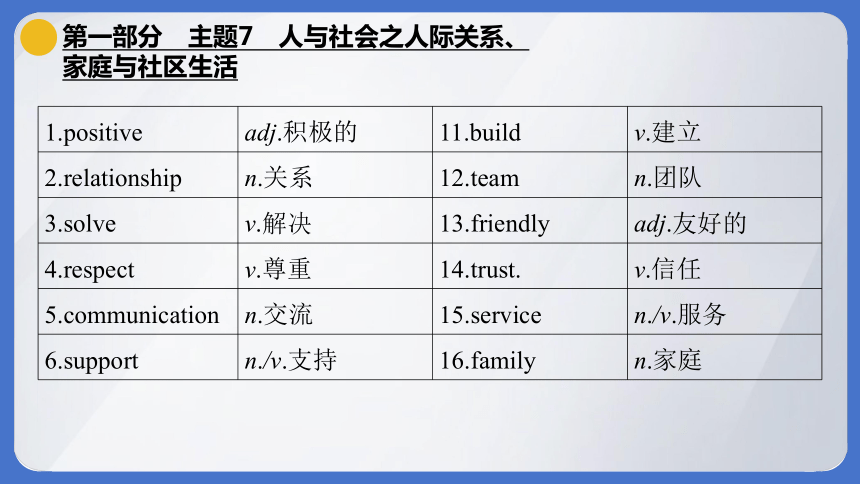
|
|
| 格式 | pptx | ||
| 文件大小 | 1.7MB | ||
| 资源类型 | 教案 | ||
| 版本资源 | 通用版 | ||
| 科目 | 英语 | ||
| 更新时间 | 2024-02-24 00:00:00 | ||
图片预览

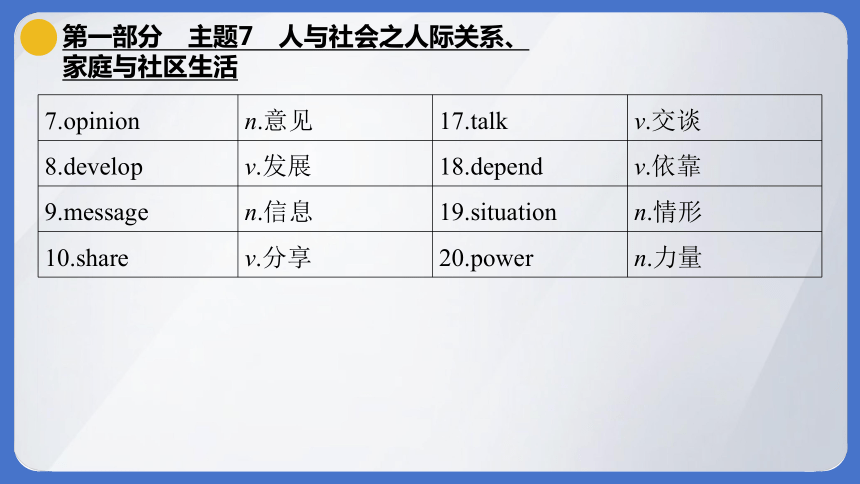
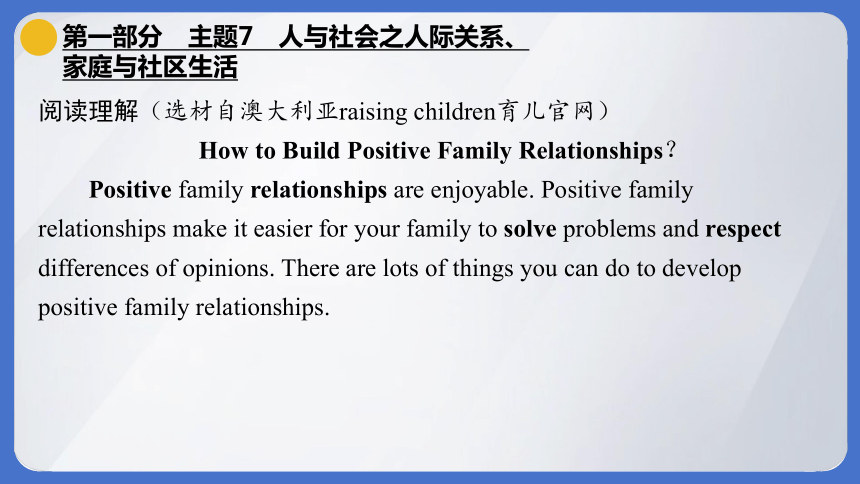

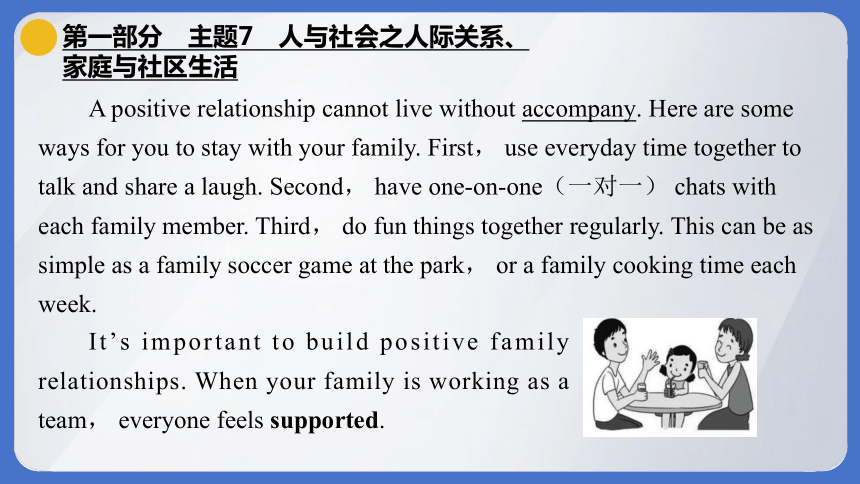
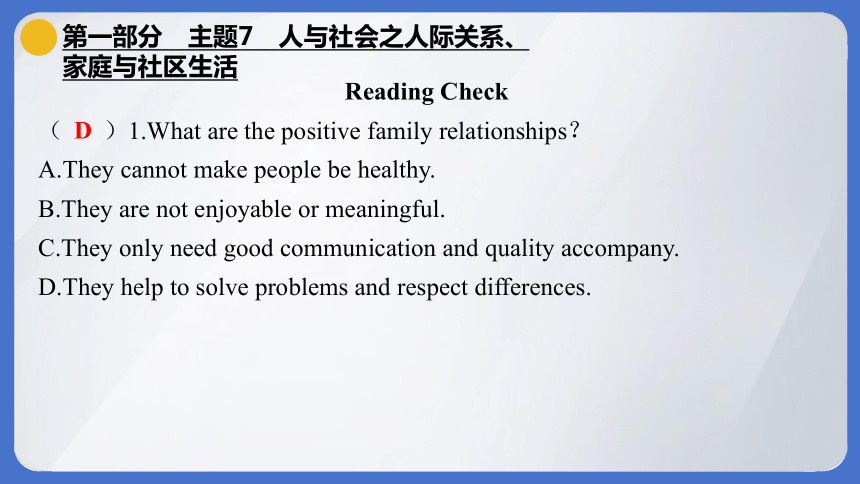
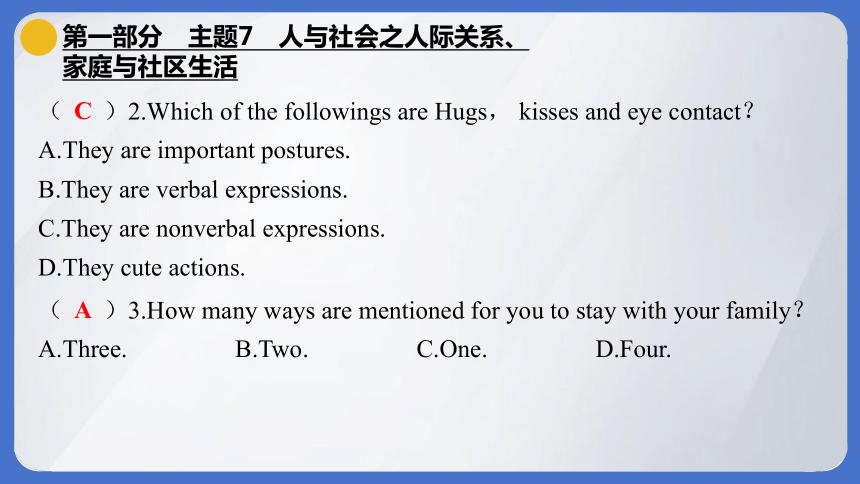
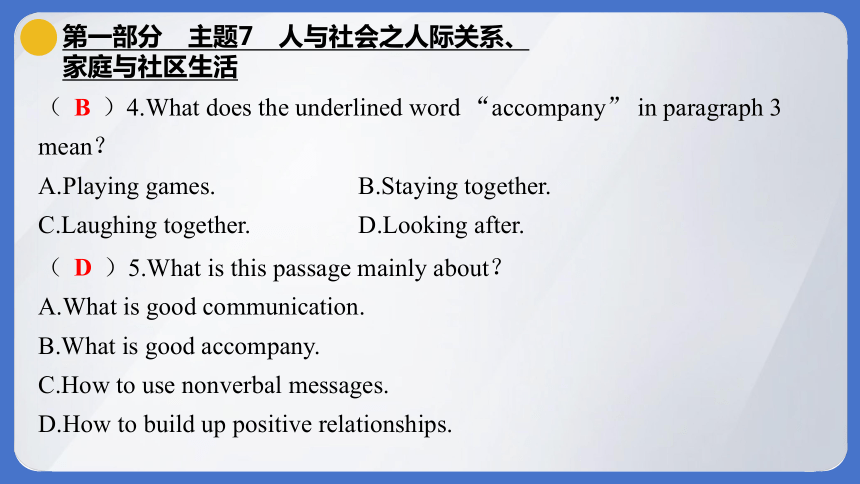
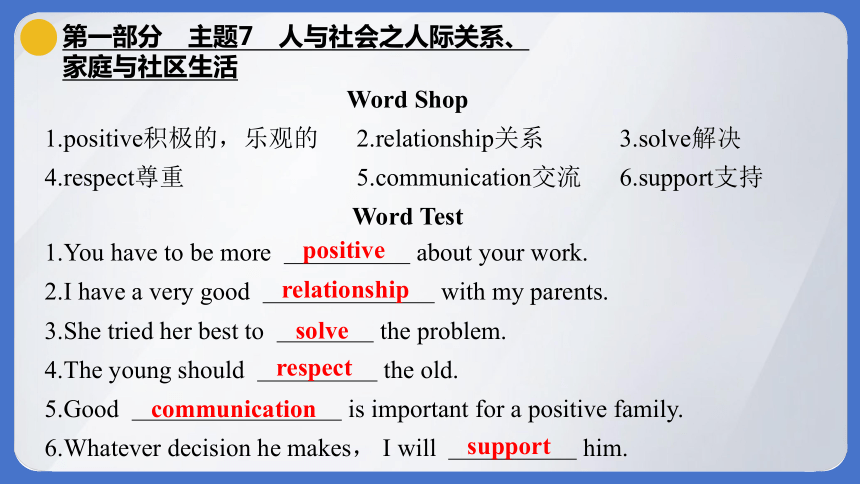
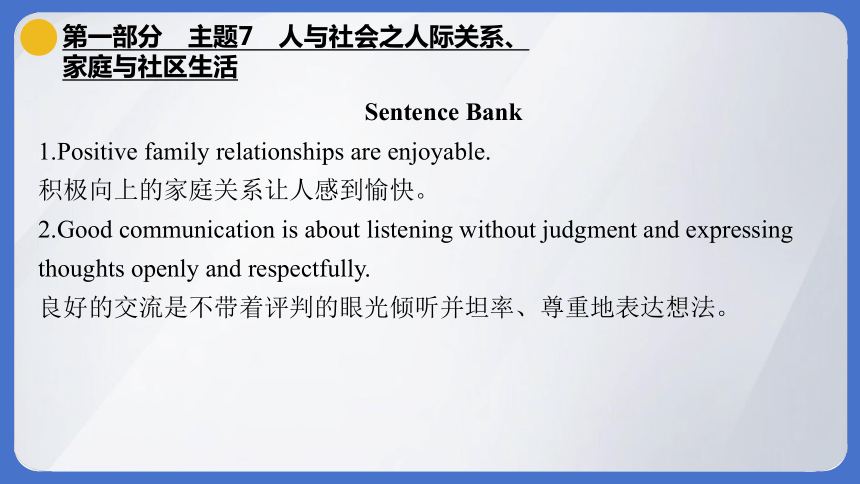
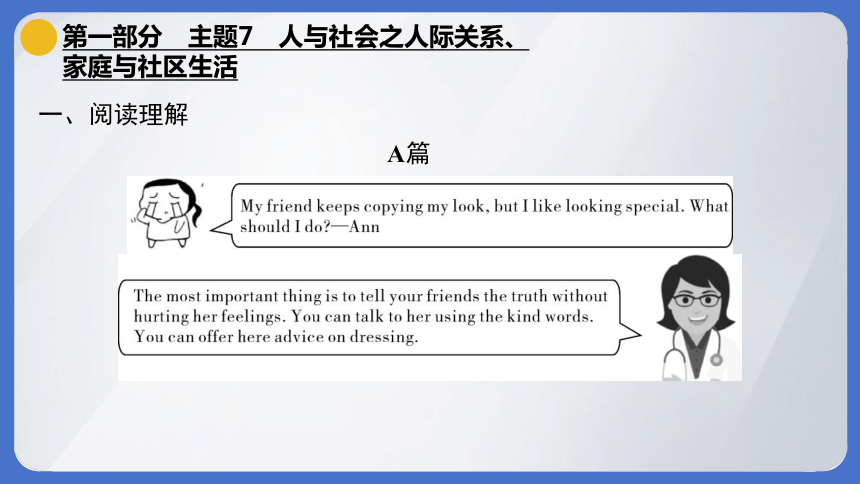
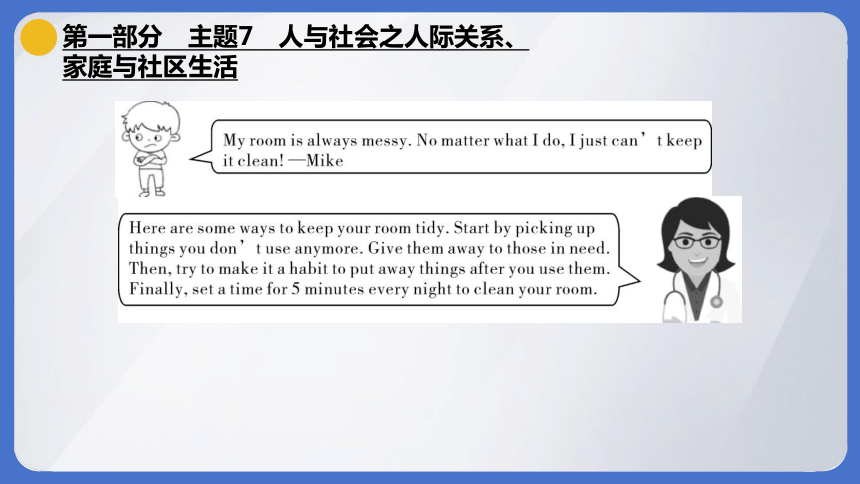
文档简介
(共50张PPT)
1.positive adj.积极的 11.build v.建立
2.relationship n.关系 12.team n.团队
3.solve v.解决 13.friendly adj.友好的
4.respect v.尊重 14.trust. v.信任
5.communication n.交流 15.service n./v.服务
6.support n./v.支持 16.family n.家庭
7.opinion n.意见 17.talk v.交谈
8.develop v.发展 18.depend v.依靠
9.message n.信息 19.situation n.情形
10.share v.分享 20.power n.力量
阅读理解(选材自澳大利亚raising children育儿官网)
How to Build Positive Family Relationships?
Positive family relationships are enjoyable. Positive family
relationships make it easier for your family to solve problems and respect
differences of opinions. There are lots of things you can do to develop
positive family relationships.
Positive families grow from good communication. Good
communication is about listening without judgment(评判) and expressing
thoughts openly and respectfully. Not all communication happens in words.
Sometimes communications happen non-verbally(非言语交际). For
example, hugs, kisses and eye contact(交流) send the message that
you want to be close to your child. But a frown(皱眉) might mean that
you don’t want to be with them.
A positive relationship cannot live without accompany. Here are some
ways for you to stay with your family. First, use everyday time together to
talk and share a laugh. Second, have one-on-one(一对一) chats with
each family member. Third, do fun things together regularly. This can be as
simple as a family soccer game at the park, or a family cooking time each
week.
It’s important to build positive family relationships. When your family is working as a team, everyone feels supported.
Reading Check
( D )1.What are the positive family relationships?
A.They cannot make people be healthy.
B.They are not enjoyable or meaningful.
C.They only need good communication and quality accompany.
D.They help to solve problems and respect differences.
D
( C )2.Which of the followings are Hugs, kisses and eye contact?
A.They are important postures.
B.They are verbal expressions.
C.They are nonverbal expressions.
D.They cute actions.
( A )3.How many ways are mentioned for you to stay with your family?
A.Three. B.Two. C.One. D.Four.
C
A
( B )4.What does the underlined word “accompany” in paragraph 3
mean?
A.Playing games. B.Staying together.
C.Laughing together. D.Looking after.
( D )5.What is this passage mainly about?
A.What is good communication.
B.What is good accompany.
C.How to use nonverbal messages.
D.How to build up positive relationships.
B
D
1.You have to be more about your work.
2.I have a very good with my parents.
3.She tried her best to the problem.
4.The young should the old.
5.Good is important for a positive family.
6.Whatever decision he makes, I will him.
positive
relationship
solve
respect
communication
support
Word Shop
1.positive积极的,乐观的 2.relationship关系 3.solve解决
4.respect尊重 5.communication交流 6.support支持
Word Test
Sentence Bank
1.Positive family relationships are enjoyable.
积极向上的家庭关系让人感到愉快。
2.Good communication is about listening without judgment and expressing
thoughts openly and respectfully.
良好的交流是不带着评判的眼光倾听并坦率、尊重地表达想法。
一、阅读理解
A篇
( A )1.Where can you most probably read this article?
A.In a newspaper. B.In a science magazine.
C.In a school notice. D.In a geography book.
( B )2.Who might be most interested in this passage?
A.Young sport lovers. B.Teenagers in need of help.
C.Summer camp planners. D.Kids looking for dressing ideas.
A
B
( C )3.What problem does Mike face?
A.Having an unwanted holiday plan.
B.Failing to manage his time wisely.
C.Not knowing how to tidy his room.
D.Unable to get on with his friends.
C
( D )4.What advice does Jessie get?
A.Tell her parents how she feels.
B.Be ready to help other students.
C.Study harder in the summer camp.
D.See the advantages of the camp.
D
( B )5.The underlined word “They” refer to .
A.Parents. B.New friends.
C.Teachers. D.Doctors.
B
二、阅读理解
C篇
配对阅读。左栏是五个人的人际交往问题,右栏是七个建议,请根
据这五个人的问题为他们选择最合适的建议。
A.You might ask your friend why she likes to call you by your last name.
Perhaps she means it as a sign of affection(喜爱) or a friendly nickname.
Once you understand why she likes to call you that, it might not bother
you so much.
B.It’s upsetting when a friend acts this way. You might firmly say something
like “Stop doing that. I don’t like it.” That may help him understand that
you don’t think it’s funny.
C.Instead of focusing on all the options you can choose from, you may
find it helpful to think about how you feel. Spending some quiet time
coloring or reading might be best.
D.It’s almost impossible for people to share their lives with others without
sometimes feeling angry, sad, or upset. These feelings are normal and
OK. The healthy way to deal with them is to express them in a calm,
mature(成熟的) way.
E.It can take a while to get used to talking on the phone. You could ask your
parents about your relatives’ interests, too. For example, if your uncle
likes knock-knock jokes, you might share one with him.
F.Think about what happened and how you can do better next time. You
might also use this time to show your parents that you want to be more
responsible.
G.To help you figure out if you miss dancing or your friends, you might
practice dancing at home for 20 minutes each day for one week. At the end
of the week, if you find yourself looking forward to dancing, then you
will know that you miss ballet.
( B )1.One day on the bus, my friend kept pulling my hair and
pinching(捏,拧) me. How can I make him stop?
( G )2.I don’t know if I should go back to ballet class. I can’t tell if I
want to dance or if I just miss my friends.
( D )3.Sometimes I feel very upset. But I’m scared to tell my feelings
because I know I shouldn’t get angry with my friends and family.
( E )4.I don’t really like talking to my relatives on the phone. I feel
shy.
( A )5.My friend always calls me by my last name, not my first. I
tell her to stop, but she still does it.
B
G
D
E
A
三、语法选择
One day, the father of a very rich family took his son on a trip to the
countryside. The father wanted to show the son how poor people lived.
They 1 a couple of days and nights on the farm of a very poor family.
On their return from the trip, the father asked his son, “ 2 was
the trip?”
“It was 3 , Dad.”
“Did you 4 how poor people live?” the father asked.
“Oh yeah,” said the son.
“So, tell me, what did you learn 5 the trip?” asked the
father.
The son answered, “I saw that we have one dog and they have four.
We have a 6 pool in the middle of our garden and they have a stream that
has no end. We have imported(进口) lanterns in our garden and they have
the stars at night. We have a small piece of land to live on and they have
fields that go beyond our sight. We have servants who serve us, 7 they
serve others. We buy our food, but they grow 8 . We have walls around
to protect us, but they have friends 9 them.”
The 10 father was speechless. Then his son added, “Thanks Dad
for showing me how poor we are.”
Isn’t perspective(角度) a wonderful thing? Maybe we should give
thanks for everything we have, instead of worrying about what we don’t
have.
( B )1.A.spend B.spent C.is spending
( C )2.A.When B.What C.How
( A )3.A.great B.greater C.greatest
( A )4.A.see B.saw C.have seen
( B )5.A.to B.from C.for
( C )6.A.swim B.swims C.swimming
( C )7.A.if B.though C.but
( C )8.A.them B.their C.theirs
( B )9.A.protect B.to protect C.protecting
( C )10.A.boy B.boys C.boy’s
B
C
A
A
B
C
C
C
B
C
一、完形填空
In my opinion, the generation gap(代沟) is a result of our
“pride” and “prejudice(偏见)”. Since I entered junior high school,
my parents and I have had different 1 . My mother always ends by telling
me that, “A child knows nothing about this!”, and I often end up
saying as a reply, “Are you still living in the 19th 2 ?” We are
growing up in a century that is quite 3 from the one in which our parents
grew up, so it is natural for us to have developed values that are different
from those of our parents.
But our parents still always 4 us as little kids. It seems that they
aren’t willing to accept the fact that we are growing up. So they have
trouble 5 the fact. During adolescence(青春期), we feel a strong
need to express 6 , but our parents are often unwilling to listen to
us. 7 , they think they are always correct. Why are they unable to 8
their hearts and communicate more with their children? In this way, their
children can feel loved and 9 .
I think both sides must 10 their pride and prejudice and build trust.
Only in this way will the generation gap slowly disappear.
( D )1.A.ways B.stories C.examples D.opinions
( C )2.A.year B.month C.century D.suggestion
( C )3.A.far B.absent C.different D.safe
( B )4.A.care B.treat C.study D.watch
( A )5.A.facing B.looking C.thinking D.watching
( C )6.A.myself B.himself C.ourselves D.yourselves
( B )7.A.However B.Instead C.Luckily D.Especially
( A )8.A.open B.close C.believe D.listen
( D )9.A.led B.taught C.controlled D.understood
( B )10.A.ask for B.give up C.put into D.pay attention to
D
C
C
B
A
C
B
A
D
B
二、阅读理解
B篇
There are millions of teenagers using social media every day. Many
teenagers agree that social media helps them stay connected to their friends
and make new friends from around the world. More and more teenagers are
willing to share their life and thoughts online. Thanks to advances in
technology, how teenagers make friends and communicate with each other
has changed greatly.
However, social media also has many disadvantages. One of them is
that some parents believe social media makes it harder for families to spend
time together. They say that things on the Internet seem appealing, and that
their kids can’t take their eyes off the screen. As a result, teenagers pay no
attention to the rest of their family.
Another serious problem is cyberbullying(网络欺凌). A great many
people have experienced cyberbullying. So how can teenagers protect
themselves if the cyberbullying has taken place? Expert Gwen Taylor
suggests, “The first thing to do is to tell a trusted adult about what is going
on.” “If someone posts something that makes you afraid, you can report
it to the social media platform. You’d better keep the screenshot (屏幕截
图) of the behavior because this will help you to report it and help others to
help you,” says Taylor.
Perhaps the more effective way is to try to be a good digital citizen.
Good digital citizens use online spaces positively. Respect other people’s
feelings and don’t be mean (刻薄的).
( C )1.How many teenagers use social media every day?
A.Thousands of. B.Hundreds of.
C.Millions of. D.Dozens of.
( A )2.What’s the advantage of social media according to the passage?
A.It helps teenagers make more friends.
B.It enables teenagers to do more exercise.
C.It makes teenagers focus on their schoolwork.
D.It offers teenagers chances to stay with families.
C
A
( A )3.What does the underlined word “appealing” probably mean?
A.Interesting. B.Tiring.
C.Traditional. D.Scary.
( D )4.What should teenagers do when faced with cyberbullying?
A.Believe it’s not a big deal. B.Keep the problem a secret.
C.Never surf the Internet again. D.Tell a trusted adult about it.
A
D
( C )5.Which statement would the author most probably agree with?
A.Teenagers are too shy to share their opinions online.
B.All the teenagers have learned the rules of being safe online.
C.Teenagers should be responsible for their words and actions online.
D.It’s wise to keep silent when you find your friend is being bullied online.
C
三、短文填空(新考法)
请从方框内选择适当的词并用其正确形式填空,使文章完整连贯。
注意每空一词,每词仅用一次,有两词为多余项。请将答案写在答题卡
对应题目的答题位置上。
uncle tell out tired stone where listen come when like
heavy us
We used to spend summer with parents. But we spent this summer with
our 1 . He loved taking walks to collect stones. One day, he brought us
backpacks and 2 us to go to the mountain with him, and carry the
stones. The whole day, we walked around. Sometimes our uncle put stones
in our bags. Sometimes he took stones 3 of our bags. We didn’t know
why he did this.
When we returned to the house, we were very 4 . The backpacks
were so heavy. We felt happy when we could take them off. Yet our uncle’s
backpack was half empty.
“Why did you give us so many 5 ?” we asked.
“I didn’t. You did.” he said, “You didn’t know it, but I gave you
a small test to test the way you think. I 6 to every word you said. When
you said something that made us unhappy or sad. I added a stone to your
bags. 7 you talked about something with positive(积极的) thinking,
I took out a stone. And now look at your backpack. The backpacks are almost
full.”
Your thoughts about the bad side of a situation are just stones.
You carry them in your mind just like the stones in your backpacks. The more
negative(消极的) thoughts you have, the your mind will be. With
great love, our uncle taught one of the most important lessons in
life—the power of the way we think. I will never forget this lesson.
1. 2. 3. 4.
5. 6. 7. 8.
9. 10.
uncle
told/asked
out
tired
stones
listened
When
like
heavier
us
8
9
10
读写综合
A.回答问题
According to a recent study, with 83% of teens having their own phones now, more and more of their parents are facing the question: to watch or not? Some parents even decide to put a tracking(跟踪) app on the kids’ phones. Is it a good idea for them to get on well with their children? Here are some ideas from different people.
Jenny, a mother of an excellent boy. “I always don’t know where he
is. After he found out that I put an app to track him two weeks ago,
relationship between us has become bad.”
Ann Homayoun, an expert from Harford University. “I’ve found
teens are acceptable if the tracking app is used to make sure that they are
safe. If adults do it secretly, teens will get mad.”
Mark Bell, a father of a teenage girl. “We don’t have tracking
apps, but we have some rules that my daughter must follow. If she doesn’t
agree, she will not have the phone. For example, my daughter must
“friend” me on social media(社交媒体) so that I can read her posts.”
Mr. White, a doctor from a college. “Parents must let children know
they are being ‘watched’ by parents. If parents don’t do it openly, it is bad
for the parent and child’s relationship. ”
1.What do some parents even decide to do according to the study?
They decide to put a tracking app on the kids’ phones.
2.When did Jenny’s son find out that he was tracked?
3.Who is Ann Homayoun?
He found that two weeks ago.
Ann Homayoun is an expert from Harford University.
4.If Mark Bell’s daughter doesn’t agree with the rules, what will happen?
5.According to Mr. White, how should parents “watch” their children?
She won’t have the phone.
They should do it openly.
B.书面表达
假设你是李华。你的英国朋友迈克(Mike)来信说他发现父母使用
应用程序对他的手机进行监控,他感到很不开心。请写一封回信给他。
内容包括:
(1)表示理解他的感受;
(2)给予建议(至少2条);
(3)表达祝愿。
作文要求:
(1)不能照抄原文,不得在作文中出现学校的真实名称和考生的
真实姓名;
(2)语句连贯,词数80左右(书信开头和结尾已给出,不计入总
词数)。
写作指导
一、形式:
1.时态:
2.人称:
二、内容:
1.理解他的感受
I’m sorry to hear that … I know how you feel …
2. 给予建议
I might give you some advice. First…, Second …
3. 表达祝愿。
I hope …
三、布局
1.我的写作将会分 段
2. 第1段写 ;
第2段写 ;
第3段写
四、创作
Dear Mike,
I’m sorry to hear that your parents put a tracking app on your
phone. I know how you feel because my parents also did it last month. So
I think I might give you some advice. First, talk to your parents that
you are no longer a kid. And tell them that you are not feeling good to be
“watched”. Second, when you hang out with friends, tell them
where you go so that they won’t feel worried about you. Then they might
not “watch” you any more.
Best Regards,
Li Hua
I hope you can sit down and talk with your parents. And I also
hope everything will be good with you.
1.positive adj.积极的 11.build v.建立
2.relationship n.关系 12.team n.团队
3.solve v.解决 13.friendly adj.友好的
4.respect v.尊重 14.trust. v.信任
5.communication n.交流 15.service n./v.服务
6.support n./v.支持 16.family n.家庭
7.opinion n.意见 17.talk v.交谈
8.develop v.发展 18.depend v.依靠
9.message n.信息 19.situation n.情形
10.share v.分享 20.power n.力量
阅读理解(选材自澳大利亚raising children育儿官网)
How to Build Positive Family Relationships?
Positive family relationships are enjoyable. Positive family
relationships make it easier for your family to solve problems and respect
differences of opinions. There are lots of things you can do to develop
positive family relationships.
Positive families grow from good communication. Good
communication is about listening without judgment(评判) and expressing
thoughts openly and respectfully. Not all communication happens in words.
Sometimes communications happen non-verbally(非言语交际). For
example, hugs, kisses and eye contact(交流) send the message that
you want to be close to your child. But a frown(皱眉) might mean that
you don’t want to be with them.
A positive relationship cannot live without accompany. Here are some
ways for you to stay with your family. First, use everyday time together to
talk and share a laugh. Second, have one-on-one(一对一) chats with
each family member. Third, do fun things together regularly. This can be as
simple as a family soccer game at the park, or a family cooking time each
week.
It’s important to build positive family relationships. When your family is working as a team, everyone feels supported.
Reading Check
( D )1.What are the positive family relationships?
A.They cannot make people be healthy.
B.They are not enjoyable or meaningful.
C.They only need good communication and quality accompany.
D.They help to solve problems and respect differences.
D
( C )2.Which of the followings are Hugs, kisses and eye contact?
A.They are important postures.
B.They are verbal expressions.
C.They are nonverbal expressions.
D.They cute actions.
( A )3.How many ways are mentioned for you to stay with your family?
A.Three. B.Two. C.One. D.Four.
C
A
( B )4.What does the underlined word “accompany” in paragraph 3
mean?
A.Playing games. B.Staying together.
C.Laughing together. D.Looking after.
( D )5.What is this passage mainly about?
A.What is good communication.
B.What is good accompany.
C.How to use nonverbal messages.
D.How to build up positive relationships.
B
D
1.You have to be more about your work.
2.I have a very good with my parents.
3.She tried her best to the problem.
4.The young should the old.
5.Good is important for a positive family.
6.Whatever decision he makes, I will him.
positive
relationship
solve
respect
communication
support
Word Shop
1.positive积极的,乐观的 2.relationship关系 3.solve解决
4.respect尊重 5.communication交流 6.support支持
Word Test
Sentence Bank
1.Positive family relationships are enjoyable.
积极向上的家庭关系让人感到愉快。
2.Good communication is about listening without judgment and expressing
thoughts openly and respectfully.
良好的交流是不带着评判的眼光倾听并坦率、尊重地表达想法。
一、阅读理解
A篇
( A )1.Where can you most probably read this article?
A.In a newspaper. B.In a science magazine.
C.In a school notice. D.In a geography book.
( B )2.Who might be most interested in this passage?
A.Young sport lovers. B.Teenagers in need of help.
C.Summer camp planners. D.Kids looking for dressing ideas.
A
B
( C )3.What problem does Mike face?
A.Having an unwanted holiday plan.
B.Failing to manage his time wisely.
C.Not knowing how to tidy his room.
D.Unable to get on with his friends.
C
( D )4.What advice does Jessie get?
A.Tell her parents how she feels.
B.Be ready to help other students.
C.Study harder in the summer camp.
D.See the advantages of the camp.
D
( B )5.The underlined word “They” refer to .
A.Parents. B.New friends.
C.Teachers. D.Doctors.
B
二、阅读理解
C篇
配对阅读。左栏是五个人的人际交往问题,右栏是七个建议,请根
据这五个人的问题为他们选择最合适的建议。
A.You might ask your friend why she likes to call you by your last name.
Perhaps she means it as a sign of affection(喜爱) or a friendly nickname.
Once you understand why she likes to call you that, it might not bother
you so much.
B.It’s upsetting when a friend acts this way. You might firmly say something
like “Stop doing that. I don’t like it.” That may help him understand that
you don’t think it’s funny.
C.Instead of focusing on all the options you can choose from, you may
find it helpful to think about how you feel. Spending some quiet time
coloring or reading might be best.
D.It’s almost impossible for people to share their lives with others without
sometimes feeling angry, sad, or upset. These feelings are normal and
OK. The healthy way to deal with them is to express them in a calm,
mature(成熟的) way.
E.It can take a while to get used to talking on the phone. You could ask your
parents about your relatives’ interests, too. For example, if your uncle
likes knock-knock jokes, you might share one with him.
F.Think about what happened and how you can do better next time. You
might also use this time to show your parents that you want to be more
responsible.
G.To help you figure out if you miss dancing or your friends, you might
practice dancing at home for 20 minutes each day for one week. At the end
of the week, if you find yourself looking forward to dancing, then you
will know that you miss ballet.
( B )1.One day on the bus, my friend kept pulling my hair and
pinching(捏,拧) me. How can I make him stop?
( G )2.I don’t know if I should go back to ballet class. I can’t tell if I
want to dance or if I just miss my friends.
( D )3.Sometimes I feel very upset. But I’m scared to tell my feelings
because I know I shouldn’t get angry with my friends and family.
( E )4.I don’t really like talking to my relatives on the phone. I feel
shy.
( A )5.My friend always calls me by my last name, not my first. I
tell her to stop, but she still does it.
B
G
D
E
A
三、语法选择
One day, the father of a very rich family took his son on a trip to the
countryside. The father wanted to show the son how poor people lived.
They 1 a couple of days and nights on the farm of a very poor family.
On their return from the trip, the father asked his son, “ 2 was
the trip?”
“It was 3 , Dad.”
“Did you 4 how poor people live?” the father asked.
“Oh yeah,” said the son.
“So, tell me, what did you learn 5 the trip?” asked the
father.
The son answered, “I saw that we have one dog and they have four.
We have a 6 pool in the middle of our garden and they have a stream that
has no end. We have imported(进口) lanterns in our garden and they have
the stars at night. We have a small piece of land to live on and they have
fields that go beyond our sight. We have servants who serve us, 7 they
serve others. We buy our food, but they grow 8 . We have walls around
to protect us, but they have friends 9 them.”
The 10 father was speechless. Then his son added, “Thanks Dad
for showing me how poor we are.”
Isn’t perspective(角度) a wonderful thing? Maybe we should give
thanks for everything we have, instead of worrying about what we don’t
have.
( B )1.A.spend B.spent C.is spending
( C )2.A.When B.What C.How
( A )3.A.great B.greater C.greatest
( A )4.A.see B.saw C.have seen
( B )5.A.to B.from C.for
( C )6.A.swim B.swims C.swimming
( C )7.A.if B.though C.but
( C )8.A.them B.their C.theirs
( B )9.A.protect B.to protect C.protecting
( C )10.A.boy B.boys C.boy’s
B
C
A
A
B
C
C
C
B
C
一、完形填空
In my opinion, the generation gap(代沟) is a result of our
“pride” and “prejudice(偏见)”. Since I entered junior high school,
my parents and I have had different 1 . My mother always ends by telling
me that, “A child knows nothing about this!”, and I often end up
saying as a reply, “Are you still living in the 19th 2 ?” We are
growing up in a century that is quite 3 from the one in which our parents
grew up, so it is natural for us to have developed values that are different
from those of our parents.
But our parents still always 4 us as little kids. It seems that they
aren’t willing to accept the fact that we are growing up. So they have
trouble 5 the fact. During adolescence(青春期), we feel a strong
need to express 6 , but our parents are often unwilling to listen to
us. 7 , they think they are always correct. Why are they unable to 8
their hearts and communicate more with their children? In this way, their
children can feel loved and 9 .
I think both sides must 10 their pride and prejudice and build trust.
Only in this way will the generation gap slowly disappear.
( D )1.A.ways B.stories C.examples D.opinions
( C )2.A.year B.month C.century D.suggestion
( C )3.A.far B.absent C.different D.safe
( B )4.A.care B.treat C.study D.watch
( A )5.A.facing B.looking C.thinking D.watching
( C )6.A.myself B.himself C.ourselves D.yourselves
( B )7.A.However B.Instead C.Luckily D.Especially
( A )8.A.open B.close C.believe D.listen
( D )9.A.led B.taught C.controlled D.understood
( B )10.A.ask for B.give up C.put into D.pay attention to
D
C
C
B
A
C
B
A
D
B
二、阅读理解
B篇
There are millions of teenagers using social media every day. Many
teenagers agree that social media helps them stay connected to their friends
and make new friends from around the world. More and more teenagers are
willing to share their life and thoughts online. Thanks to advances in
technology, how teenagers make friends and communicate with each other
has changed greatly.
However, social media also has many disadvantages. One of them is
that some parents believe social media makes it harder for families to spend
time together. They say that things on the Internet seem appealing, and that
their kids can’t take their eyes off the screen. As a result, teenagers pay no
attention to the rest of their family.
Another serious problem is cyberbullying(网络欺凌). A great many
people have experienced cyberbullying. So how can teenagers protect
themselves if the cyberbullying has taken place? Expert Gwen Taylor
suggests, “The first thing to do is to tell a trusted adult about what is going
on.” “If someone posts something that makes you afraid, you can report
it to the social media platform. You’d better keep the screenshot (屏幕截
图) of the behavior because this will help you to report it and help others to
help you,” says Taylor.
Perhaps the more effective way is to try to be a good digital citizen.
Good digital citizens use online spaces positively. Respect other people’s
feelings and don’t be mean (刻薄的).
( C )1.How many teenagers use social media every day?
A.Thousands of. B.Hundreds of.
C.Millions of. D.Dozens of.
( A )2.What’s the advantage of social media according to the passage?
A.It helps teenagers make more friends.
B.It enables teenagers to do more exercise.
C.It makes teenagers focus on their schoolwork.
D.It offers teenagers chances to stay with families.
C
A
( A )3.What does the underlined word “appealing” probably mean?
A.Interesting. B.Tiring.
C.Traditional. D.Scary.
( D )4.What should teenagers do when faced with cyberbullying?
A.Believe it’s not a big deal. B.Keep the problem a secret.
C.Never surf the Internet again. D.Tell a trusted adult about it.
A
D
( C )5.Which statement would the author most probably agree with?
A.Teenagers are too shy to share their opinions online.
B.All the teenagers have learned the rules of being safe online.
C.Teenagers should be responsible for their words and actions online.
D.It’s wise to keep silent when you find your friend is being bullied online.
C
三、短文填空(新考法)
请从方框内选择适当的词并用其正确形式填空,使文章完整连贯。
注意每空一词,每词仅用一次,有两词为多余项。请将答案写在答题卡
对应题目的答题位置上。
uncle tell out tired stone where listen come when like
heavy us
We used to spend summer with parents. But we spent this summer with
our 1 . He loved taking walks to collect stones. One day, he brought us
backpacks and 2 us to go to the mountain with him, and carry the
stones. The whole day, we walked around. Sometimes our uncle put stones
in our bags. Sometimes he took stones 3 of our bags. We didn’t know
why he did this.
When we returned to the house, we were very 4 . The backpacks
were so heavy. We felt happy when we could take them off. Yet our uncle’s
backpack was half empty.
“Why did you give us so many 5 ?” we asked.
“I didn’t. You did.” he said, “You didn’t know it, but I gave you
a small test to test the way you think. I 6 to every word you said. When
you said something that made us unhappy or sad. I added a stone to your
bags. 7 you talked about something with positive(积极的) thinking,
I took out a stone. And now look at your backpack. The backpacks are almost
full.”
Your thoughts about the bad side of a situation are just stones.
You carry them in your mind just like the stones in your backpacks. The more
negative(消极的) thoughts you have, the your mind will be. With
great love, our uncle taught one of the most important lessons in
life—the power of the way we think. I will never forget this lesson.
1. 2. 3. 4.
5. 6. 7. 8.
9. 10.
uncle
told/asked
out
tired
stones
listened
When
like
heavier
us
8
9
10
读写综合
A.回答问题
According to a recent study, with 83% of teens having their own phones now, more and more of their parents are facing the question: to watch or not? Some parents even decide to put a tracking(跟踪) app on the kids’ phones. Is it a good idea for them to get on well with their children? Here are some ideas from different people.
Jenny, a mother of an excellent boy. “I always don’t know where he
is. After he found out that I put an app to track him two weeks ago,
relationship between us has become bad.”
Ann Homayoun, an expert from Harford University. “I’ve found
teens are acceptable if the tracking app is used to make sure that they are
safe. If adults do it secretly, teens will get mad.”
Mark Bell, a father of a teenage girl. “We don’t have tracking
apps, but we have some rules that my daughter must follow. If she doesn’t
agree, she will not have the phone. For example, my daughter must
“friend” me on social media(社交媒体) so that I can read her posts.”
Mr. White, a doctor from a college. “Parents must let children know
they are being ‘watched’ by parents. If parents don’t do it openly, it is bad
for the parent and child’s relationship. ”
1.What do some parents even decide to do according to the study?
They decide to put a tracking app on the kids’ phones.
2.When did Jenny’s son find out that he was tracked?
3.Who is Ann Homayoun?
He found that two weeks ago.
Ann Homayoun is an expert from Harford University.
4.If Mark Bell’s daughter doesn’t agree with the rules, what will happen?
5.According to Mr. White, how should parents “watch” their children?
She won’t have the phone.
They should do it openly.
B.书面表达
假设你是李华。你的英国朋友迈克(Mike)来信说他发现父母使用
应用程序对他的手机进行监控,他感到很不开心。请写一封回信给他。
内容包括:
(1)表示理解他的感受;
(2)给予建议(至少2条);
(3)表达祝愿。
作文要求:
(1)不能照抄原文,不得在作文中出现学校的真实名称和考生的
真实姓名;
(2)语句连贯,词数80左右(书信开头和结尾已给出,不计入总
词数)。
写作指导
一、形式:
1.时态:
2.人称:
二、内容:
1.理解他的感受
I’m sorry to hear that … I know how you feel …
2. 给予建议
I might give you some advice. First…, Second …
3. 表达祝愿。
I hope …
三、布局
1.我的写作将会分 段
2. 第1段写 ;
第2段写 ;
第3段写
四、创作
Dear Mike,
I’m sorry to hear that your parents put a tracking app on your
phone. I know how you feel because my parents also did it last month. So
I think I might give you some advice. First, talk to your parents that
you are no longer a kid. And tell them that you are not feeling good to be
“watched”. Second, when you hang out with friends, tell them
where you go so that they won’t feel worried about you. Then they might
not “watch” you any more.
Best Regards,
Li Hua
I hope you can sit down and talk with your parents. And I also
hope everything will be good with you.
